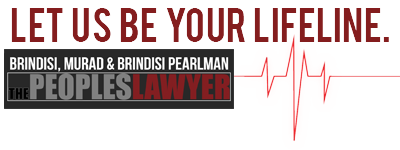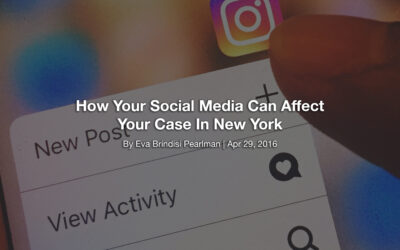We all have it. Today, social media plays a vital role in all of our lives. Teenagers, adults, even grandparents are posting vacation photos, sharing cooking videos, and more. Nonetheless, a seemingly harmless app like Facebook does have the potential to share too much information.
About 52% of employers check social media before hiring a candidate. This means that job seekers may not want to post a photo of themselves with a red solo cup in their hand or worse on their Twitter account in an effort to look more professional. Similarly, this goes for personal injury cases.
Since social media has skyrocketed, insurance companies will often check the opposing victim’s Internet presence in a personal injury lawsuit. What they find could theoretically sway a case in their favor. Information subject to discovery might be found on your social media accounts. For instance, if the injured person suffered from a neck injury in a car accident and are making a claim that their injury is limiting their ability to function and enjoy life, they probably should not be posting photos of themselves at a roller-skating rink or riding a roller coaster. That just does not add up. It destroys their credibility. Once your credibility is destroyed, your personal injury claim may be doomed.
Society is already so suspicious of personal injury litigants. A person that is seriously hurt just isn’t capable of engaging in risky activities. They wouldn’t do this because their health and future safety and well-being are too important. As such, logic would tell us to be aware of and skeptical of a personal injury litigant posting pictures or videos of themselves engaging in risky activities.
Which social media sites are the most dangerous?
- Facebook, with over 1.4 Billion users worldwide, is an insurance company’s go-to site for a record of a person’s daily life; which may also include details about their accident, their health, etc.
- Twitter gains an estimated 135,000 new users every day. The ease in sharing quick thoughts and photos make Twitter a popular target for insurance claims adjusters.
- LinkedIn is the world’s most popular professional networking site with over 100 Million users in the United States. It is safe to say that insurance companies as well as other defense attorneys will be on the site and can use it to access information about you.
- Pinterest is another popular photo-sharing site so be aware not to upload anything regarding your accident or your injuries.
- YouTube is the second most popular search engine. It can definitely threaten your case if a video of you climbing a mountain or white water rafting after your accident ends up online.
- Google+ is another social media platform where you could upload photos or discuss your case and hurt your chances in the courtroom.
- Foursquare is a popular app used to “check-in” to locations. If you are complaining of neck and back pain, and you check into a horseback riding ranch, this may definitely raise a red flag and the insurance adjusters and/or defense attorneys can try to use this against you; whereas, the truth maybe you are not even participating, rather just went along to be with family or friends.
It is very important to be extremely cautious of your social media handles during a personal injury case. The best thing is to stop using your Facebook, Twitter, LinkedIn, and YouTube accounts completely during the lawsuit. Though, this solution may not be practical as your case could run for several months or longer, and, as previously stated, social media has become a part of our lives. Yet, there are still various steps you can take to ensure your claim is not negatively affected.
What steps can I take to prevent this?
- Follow BMBP on Facebook and Twitter.
- We often post safety tips and it is a very easy way to stay connected on the latest safety issues or concerns.
- Do not post details about your accident, injuries, or recovery on social media.
- Better safe than sorry, it is best not to post a status about it, photos or videos, or respond to comments about your accident and/or injuries. This also includes conversations with your lawyer, information regarding your diagnosis and medical treatment, your frustrations with the insurance company, or email and phone exchanges with anyone involved in the case.
- Prior to posting anything on social media, ask yourself ‘How will this affect my case?’
- Before you post the photo or video of you on the dance floor at your friend’s wedding, ask yourself if a person with a neck or back injury would be busting a move. How would it look in court? In addition, if you are regularly checking in to restaurants, parties, and events, it may be less believable if you are claiming loss of enjoyment of life or emotional distress.
- Google yourself.
- You know the insurance company will do it, beat them to the punch, and look to see if there is anything they can find that may hurt your case and advise your attorney.
- Be careful of the events you accept.
- Though it may show good community standing, accepting an invitation to a charity run to walk may undermine your claim. Especially if your injuries from an accident make it hard for you to run or walk long distances due to a hurt hip, knee, or ankle.
- Increase your privacy settings.
- Though it may not completely limit access by outside sources, increasing privacy settings may help to prevent any past, present, or future information that may hurt your claim.
- Ask your friends to not post about you or tag you in photos.
- Assume all information can be accessed by the insurance company. Friends tagging you in photos of you being “active” or “checking you into” locations can threaten your claim.
- Do not accept friend requests from people you do not know.
- The same way I would advise clients not to talk to strangers about their case, the same goes for the digital world.
- Do not delete social media accounts or remove past social media posts as it could be considered information subject to discovery in your claim.
- If you posted about a sore neck one week prior to the accident, it may be considered spoliation of evidence if you delete the post. Your previous post may go to pertinent evidence about a pre-existing condition. In litigation, a party is required to preserve evidence that may be relevant to pending or reasonably foreseeable litigation.
- Know that even if you deactivate your Facebook page, your page may no longer be viewable, however, it will not erase the information that was previously posted there. Instead, that information remains present in Facebook’s internal records, so that it can be restored by reactivation of an account, or maybe obtained through a court order.
While we cannot promise complete protection of your privacy from an insurance company or the defense discovering information about you, these steps can help alleviate the chances of social media harming your case. However, again, the best thing to do is to stay off of it altogether.
If you ever have any questions regarding social media or overall Internet presence during a personal injury case, please do not hesitate to contact The People’s Lawyer. We will be more than happy to go over your case and work out a plan that is right for you. While we love social media for keeping up with family and friends, it is always important to remember to be careful with everything you post online.
Share this blog with your friends…

CONTACT US FOR A FREE CASE EVALUATION
Related Blogs
How Your Social Media Can Affect Your Case In New York
We all hear over and over again to be careful about what you post on Social Media. This is especially true for a person involved in any type of litigation, whether it is criminal, matrimonial, or civil litigation. Facebook, Twitter, YouTube, Vine, Instagram,...
Trick Or Treat: How To Have A Safe Halloween
Halloween is fun and scary, it’s when the ghosts and goblins come out of hiding, making it one of the spookiest times of the year. It’s alright to be scared by all of this harmless fun, but we should never have to feel scared because our child or a loved one...
Injured In An Accident?
Contact BMBP Today!






BRINDISI, MURAD & BRINDISI PEARLMAN
UTICA OFFICE
Utica, NY 13501
OFFICE HOURS
MONDAY – FRIDAY
9AM-5PM

